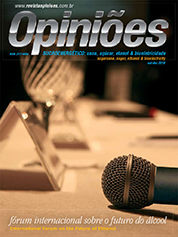Rubens Ometto Silveira Mello
Honorary Chairman of Fenasucro (Cosan, Esso and Shell)
Op-AA-26
Time for reflection
Allow me to initially express the delight I felt when Toninho Toniello, Adézio and the group that accompanied them invited me to be the Honorary Chairman of the 2010 Fenasucro, an event of utmost importance, which displays the outstanding work that for a long time has been performed in the city of Sertãozinho. I am really thrilled by this honor.
The International Forum on the Future of Ethanol, the official opening event of the Fenasucro & Agrocana trade fairs, encompassed several presentations covering various segments of our industry, with emphasis on what is being achieved in Brazil with respect to the production of sugarcane, the issue of soil preservation, climate-related topics, general aspects concerning our workforce, the research being conducted and aimed at improving raw material quality, at applying the resulting improvements in industrial activities, at the investments that are being made in infrastructure, along with all other topics concerning society’s challenge of facing the problems that arise, overcoming them with courage and competency, every day, in the quest for constantly improving the competitiveness of sugar and ethanol.
We shall see in detail the issues related to the industry’s development of sugarcane quality, cogeneration of electric power, first and second generation ethanol and other subjects. A matter that at Cosan has always been reason for concern and guidance is to find out what our weak spots are. To us it is essential to identify in advance where we can be beaten.
When one’s company starts trading its stock publicly, presenting itself in a permanent global road show, selling its product, explaining the details, it needs to have everything very well organized. At the end of a presentation two questions are always asked. The first is standard: what is it I should have asked but did not ask, and the second, what is the worrisome topic in the business.
In our business the weak spot – our Achilles heel, no doubt boils down to two problems. The issue of tax evasion, the result of our industry’s fragmentation. We have a large number of players and, making the situation even worse, our industry is working capital intensive, given that what is produced in seven months of a year must be sold in twelve months, making the sales organization quite complicated.
In the case of sugar, it’s easier because Brazil controls between 40 and 45% of the free exports and all players have access to pre-payments and foreign exchange advance payments on exports. This fact helps in the organization and improves trade issues. There is no need to carry high inventories in the course of the year. In the case of ethanol, management is very much more complicated.
Due to the time lag between production and sale, when cash is low, when one must resort to financial backup, one is faced with the very high cost of money in the market. The way out is to dump inventory, but when many companies do this at the same time, the price plummets, bringing about ethanol price volatility. This is bad for the producer and also for the consumer because it sometimes passes the impression the industry is causing speculative movements.
In seeking a solution for this problem, we purchased the assets of Esso, in order to have direct access to the consumer, taking over better control of the supply chain. This was very good, because it provided us better integration and better understanding among us, the producers and the fuel distribution industry. What we saw at the time was antagonism, a confrontation of ideas among UNICA, the producers, and the people at Sindicom and at the fuel distributors.
Then, when we took a closer look at this business, we noticed that it wasn’t quite what we thought it was. The problem with ethanol is really seasonality, along with the issue of working capital and the actual lack of organization in the sales structure. The consolidation movement that has been going on in the industry is quite healthy, because when one concentrates and better organizes the distribution and the selling, one achieves better conditions to reach higher average prices and to diminish volatility.
Along this trend line of becoming bigger and stronger we decided to set up a joint venture company with Shell, going to a roughly 24% market share in fuel distribution in the domestic market – struggling to make second place –, while having Petrobras as the leader. More importantly, Shell is one of the largest companies in the world and by far its largest fuel retailer.
The company has more than 45,000 fuel stations around the world and one of the successful outcomes we hoped for going into the joint venture was to be able to use these assets and the logistics around the globe to market even more ethanol, really making it a world reaching commodity. If we should not succeed in doing this, I see reason for concern about definitively consolidating ethanol, given the aspects involving its commercialization. If we succeed in this project, I believe the ethanol market will be much stronger, since we will be able to better sell it in our country.
May the politicians make the effort to equalize taxes on ethanol in Brazil. In the State of São Paulo, we have a unique situation with ethanol at 12%, whereas elsewhere the percentages are much higher, making ethanol less attractive in comparison with gasoline, thereby encouraging some producers, distributors and resellers to evade taxes, which results in that honorable companies lose competitiveness. This is the message I submit for reflection: we should focus on going in this direction. Finally, I congratulate the organizers of this International Forum and the Trade Fairs on the competency with which they represent the sugar and ethanol industry by means of this event.




